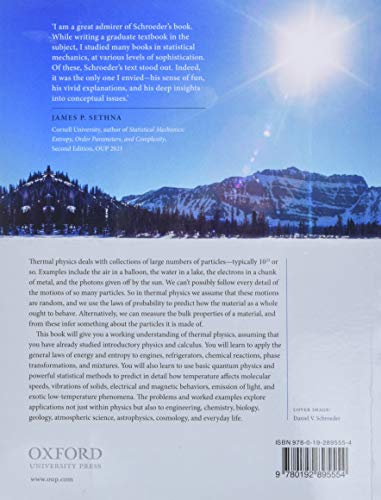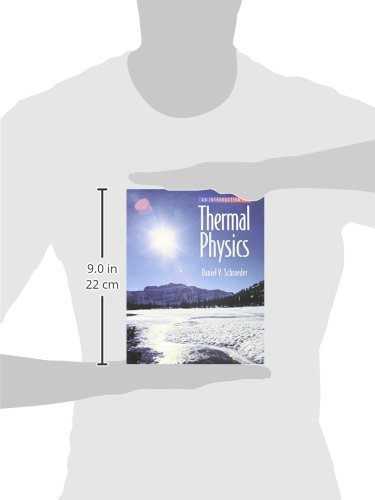Thermal physics deals with collections of large numbers of particles – typically 10 to the 23rd power or so. Examples include the air in a balloon, the water in a lake, the electrons in a chunk of metal, and the photons given off by the sun. We can’t possibly follow every detail of the motions of so many particles. So in thermal physics we assume that these motions are random, and we use the laws of probability to predict how the material as a whole ought to behave. Alternatively, we can measure the bulk properties of a material, and from these infer something about the particles it is made of. This book will give you a working understanding of thermal physics, assuming that you have already studied introductory physics and calculus. You will learn to apply the general laws of energy and entropy to engines, refrigerators, chemical reactions, phase transformations, and mixtures. You will also learn to use basic quantum physics and powerful statistical methods to predict in detail how temperature affects molecular speeds, vibrations of solids, electrical and magnetic behaviors, emission of light, and exotic low-temperature phenomena. The problems and worked examples explore applications not just within physics but also to engineering, chemistry, biology, geology, atmospheric science, astrophysics, cosmology, and everyday life.
An Introduction to Thermal Physics
$79.65
This textbook provides a working understanding of thermal physics and its applications across various scientific fields.
Additional information
| Weight | 0.998 lbs |
|---|---|
| Dimensions | 24.6 × 2.3 × 18.8 in |
An Introduction to Thermal Physics
$30.28
This textbook provides a working understanding of thermal physics and its applications across various scientific fields.
Thermal physics deals with collections of large numbers of particles – typically 10 to the 23rd power or so. Examples include the air in a balloon, the water in a lake, the electrons in a chunk of metal, and the photons given off by the sun. We can’t possibly follow every detail of the motions of so many particles. So in thermal physics we assume that these motions are random, and we use the laws of probability to predict how the material as a whole ought to behave. Alternatively, we can measure the bulk properties of a material, and from these infer something about the particles it is made of. This book will give you a working understanding of thermal physics, assuming that you have already studied introductory physics and calculus. You will learn to apply the general laws of energy and entropy to engines, refrigerators, chemical reactions, phase transformations, and mixtures. You will also learn to use basic quantum physics and powerful statistical methods to predict in detail how temperature affects molecular speeds, vibrations of solids, electrical and magnetic behaviors, emission of light, and exotic low-temperature phenomena. The problems and worked examples explore applications not just within physics but also to engineering, chemistry, biology, geology, atmospheric science, astrophysics, cosmology, and everyday life.
Additional information
| Weight | 0.839 lbs |
|---|---|
| Dimensions | 24.4 × 2.3 × 18.8 in |
Reviews
There are no reviews yet.
An Introduction to Thermal Physics
$12.00
This textbook introduces students to the fundamental concepts of thermodynamics and statistical mechanics.
This text looks at thermodynamics and statistical mechanics. Part I introduces concepts of thermodynamics and statistical mechanics from a unified view. Parts II and III explore further applications of classical thermodynamics and statistical mechanics. Throughout, the emphasis is on real-world applications. Table of Contents: I. FUNDAMENTALS. 1. Energy in Thermal Physics. 2. The Second Law. 3. Interactions and Implications. II. THERMODYNAMICS. 4. Engines and Refrigerators. 5. Free Energy and Chemical Thermodynamics. III. STATISTICAL MECHANICS. 6. Boltzmann Statistics. 7. Quantum Statistics. 8. Systems of Interacting Particles. Appendix A. Elements of Quantum Mechanics. Appendix B. Mathematical Results. Reference Data. Suggested Reading.
Additional information
| Weight | 0.748 lbs |
|---|---|
| Dimensions | 2.8 × 18.8 × 23.4 in |
Reviews
There are no reviews yet.
An Introduction to Thermal Physics
$31.72
This textbook provides foundational knowledge in thermal physics, a core component of advanced science curricula.
Reviews
There are no reviews yet.






















Reviews
There are no reviews yet.